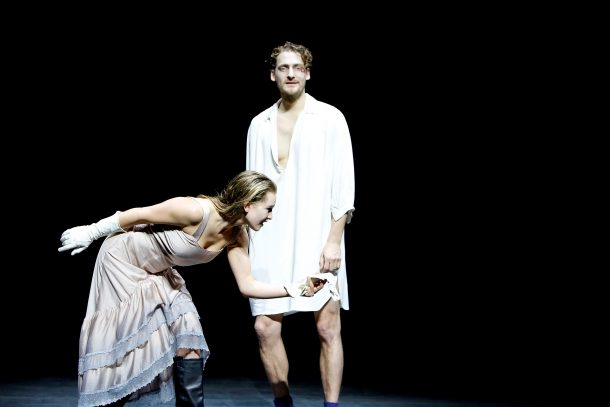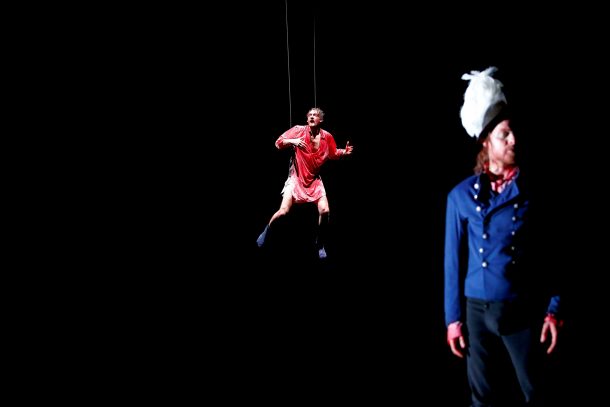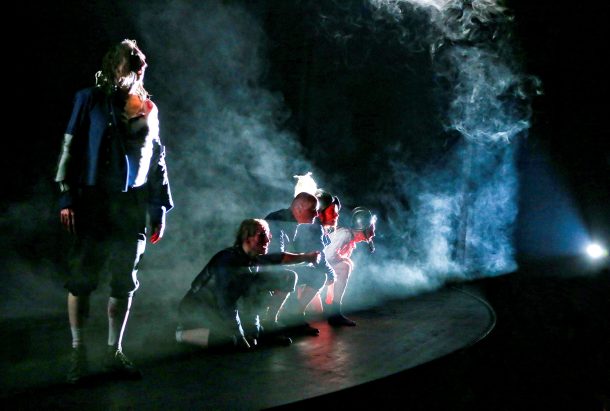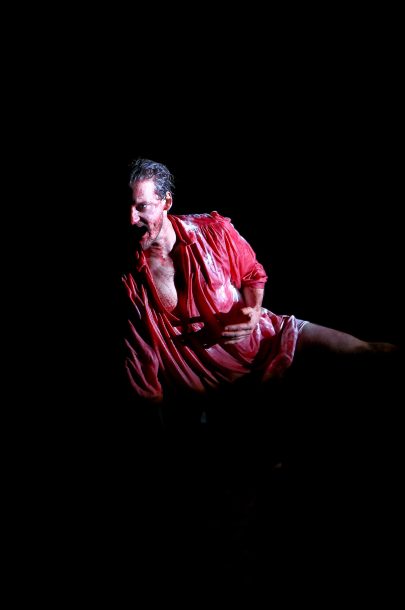Kleist’s Prinz Friedrich von Homburg
Heinrich von Kleist’s drama Prinz Friedrich von Homburg was written between 1809 and 1810 and first performed in Vienna in 1821, ten years after Kleist shot himself at the age of thirty-four. It is set in 1675, during the complicated period after the end of the Thirty Years’ War (1618-1648), but the play is not so much a historical play as a character drama. Its protagonist, Prinz Friedrich Arthur von Homburg, general of the cavalry, impetuously disobeys the order of the day given by his superiors to refrain from action until explicitly ordered to do so, and leads the charge against the enemy. He wins the battle, but is punished for his disobedience. Over the course of the play, the prince is a character caught in the dilemma between behaving like a thinking individual with agency, and subjugating himself to the laws of military discipline.
Kleist’s works come with historical baggage, in that the Nazi regime fervently embraced him and his works as completely aligned with their views about the relationship between state and people. Kleist did have as an ideal a romantic utopia that melded the state and its people into a harmonized unit, which was an element of German nationalism in his time. The Nazi ideologues took this several steps further – German cultural leadership would not only lead to national greatness, but would result in the salvation of the whole world from the confusing contradictions of Western modernity. They conveniently forgot the flip side of Kleist’s concern, namely, how to reconcile one’s individuality with this greater ideal. All his heroes, and Friedrich von Homburg is a prime example, suffer from being “Gefühlsmenschen,“ or “people of feeling,” at the core highly governed by their emotions, while also being a part of a greater unit, in this case the military. In Prinz Friedrich von Homburg, the titular protagonist is a high-achieving dreamer, a neurasthenic type (perfectly embodied by Felix Rech), who can’t really concentrate on the orders he’s being given, owing to his fantasies of being crowned in laurels and winning the hand of his beloved Princess Natalie of Orange.

Yohanna Schwertfeger (Prinzessin Natalie von Oranien) and Felix Rech (Prinz Friedrich Arthur von Homburg) in Heinrich von Kleist’s Prinz Friedrich von Homburg, directed by Michael Thalheimer at Schauspiel Frankfurt. Photo Courtesy: Schauspiel Frankfurt | Birgit Hupfeld.
The prince is a dreamer, an artistic soul, struggling to be a general. Michael Thalheimer’s production emphasizes this dreamlike quality by blurring the lines between what should be considered “real” events and Homburg’s fantasies. The central plot lines are untouched – after winning the battle, Homburg believes himself to be on top of the world; but as the political situation changes, so does his luck. He is imprisoned for disobedience by the Elector of Brandenburg, whom he considers a father figure, then, court-martialed and sentenced to death. The production has found a striking image for this – the level ground falls away, and the prince is hauled up in the air, hanging helplessly from the rafters. Nothing he thought was solid is there anymore, and he is isolated and immensely vulnerable in his bloodied nightshirt. The real possibility of his death suddenly hits home. Now, in a panic, the prince uses every path to entreat the Elector. He begs the Elector’s wife (Corinna Kirchhoff) to argue his case with her husband, and even offers to give up his beloved Princess Natalie, the Elector’s niece, so that she might marry a politically opportune partner. As the prince disintegrates, Natalie (Yohanna Schwertfeger) at first becomes stronger, pleading with the Elector in the prince’s defense, and joining forces with the military to petition for his pardon.

Felix Rech (Prinz Friedrich Arthur von Homburg) and Martin Rentzsch (Obrist Kottwitz) in Heinrich von Kleist’s Prinz Friedrich von Homburg, directed by Michael Thalheimer at Schauspiel Frankfurt. Photo Courtesy: Schauspiel Frankfurt | Birgit Hupfeld.
This petition for the pardon of Homburg has been signed by almost one hundred generals and officers, spearheaded by Colonel Kottwitz (Martin Rentzsch). Kottwitz himself argues powerfully that a soldier should be an independently thinking and feeling citizen in uniform, in open contrast to the idea of the soldier as a mere instrument.
In the midst of all these appeals, the Elector (Wolfgang Michael, looking surprisingly hippy-like, with long greasy strands and a seemingly unconventional demeanor), makes an insidious offer – if the Prince of Homburg himself is convinced that he has been sentenced unfairly, pardon will be granted. The letter detailing this proposal is then given to Natalie to hand to the prince in prison. (Such a twist would today be deemed Kafkaesque, and the younger writer openly admitted his debt to Kleist – in a letter to Max Brod, Kafka wrote, “Kleist blows into me like into an old pig’s bladder” [translation mine], proclaiming himself a lowly container for Kleist’s spirit to fill.) As Friedrich descends into a crisis of conscience, struggling to reconcile his will to live with the law of the state, Kleist’s play presents us with the annihilation of a person for the “greater good.” Jens Bisky, in his biography on Kleist, calls it “Gleichschaltung einer Seele,” the leveling of a soul — “Gleichschaltung” being a term of the Third Reich denoting that the individual must be completely submerged under the will of the collective, the totality, and the state.
At the very moment Friedrich is broken down and reduced to a mere puppet, the Elector turns around and, in a malignant twist, demonstrates his power by overriding the state’s supposedly absolute rule so as to grant the prince the pardon on which he has given up.
In a chilling final moment, the Elector presents the now broken Friedrich to his family and the military to witness him fervently embracing the will of the law and being reinstated as general. In Thalheimer’s production this is not a happy ending. Friedrich is a hollowed husk, emptied of all individuality. Natalie doesn’t crown his head with a wreath, she kills herself. The signal is clear – check your impulses, as the state’s logic will always win.
Historical hindsight provides us, of course, with countless examples of the Third Reich excelling at just such a destruction of individuals — in concentration camps, show trials, and with many smaller regulations and humiliations that communicated successfully the fact that individual wishes and urges count for nothing. While the Nazis clearly read Heinrich von Kleist as unilaterally embracing Friedrich at the end of the play as a perfect subject of the state, Kleist’s own life tells another story. Torn between an aristocratic upbringing, with its military training, and a strong artistic and individualist drive, he struggled his whole short life to reconcile these two tendencies. The last year of his life, 1811, saw him fighting for Prinz Friedrich von Homburg to be either published or produced. Having failed to achieve either, he asked to be readmitted to military service. In November of that year, a month after turning thirty-four, he killed himself. This final act by the author of Prinz Friedrich von Homburg, whose protagonist’s soul seems to be hewn so closely to his own, contradicts most powerfully any simple Nazi claim of a utopian merging of the individual with his nation. “Is it a dream?” Homburg asks at the end, confused, anxious, and resigned. Kottwitz replies, “A dream, what else?”
Dreams and Nightmares: One in War
The Frankfurt production in the hands of Michael Thalheimer emphasizes the confusion of war, the constantly changing political allegiances that make it impossible for one individual actually involved in battle to assess correctly how to proceed. What seems right in the field may appear wrong from another angle, and what may be considered a victory one day, may well be downplayed at the negotiating table the next. Only Tolstoy in War and Peace, describing in great detail the battle of Austerlitz, painted an equally realistic and thoroughly nonheroic picture of the overall confusion of war. The belief that any soldier or general in the field can really control the outcome is equivalent to hubris. Thalheimer’s production of Prinz Friedrich von Homburg emphasizes not so much that the prince, as general of the cavalry, risks his life and the lives of others to win a battle, but rather that such feats don’t necessarily matter in the bigger scheme of things. All the imagery Thalheimer employs to bring home the message that war is a bloody mess are graphic and clear – dark gray metallic-looking walls that could suggest indoors or out, the real world or the one inside Homburg’s head (Olaf Altmann handled the scenic design).

Michael Benthin (Feldmarschall Dörfling), Alex Friedland (Rittmeister von der Golz), Martin Rentzsch (Obrist Kottwitz), Stefan Konarske (Graf von Hohenzollern), and Felix Rech (Prinz Friedrich Arthur von Homburg) in Heinrich von Kleist’s Prinz Friedrich von Homburg, directed by Michael Thalheimer at Schauspiel Frankfurt. Photo Courtesy: Schauspiel Frankfurt | Birgit Hupfeld.
Soldiers stumble onto the stage out of darkness filled with fog (the lighting was done by Johan Delaere), everyone’s clothing gets successively dirtier and bloodier (Nehle Balkhausen was in charge of the costumes), and Homburg is soon clad in only a nightshirt. This shirt has multiple connotations – sleep and dreams, certainly, but when we see him in the same shirt in prison, it also suggests his increasing vulnerability. Without a uniform the prince is deprived of any protective garb. He is a prisoner, barefoot, and finally hung high from the rafters like a puppet on a string. Fragmenting, he lets go of his ambition, his desires, his dignity, and in the end, cedes even his fundamental human instinct — the will to live.

Felix Rech (Prinz Friedrich Arthur von Homburg) in Heinrich von Kleist’s Prinz Friedrich von Homburg, directed by Michael Thalheimer at Schauspiel Frankfurt. Photo Courtesy: Schauspiel Frankfurt | Birgit Hupfeld.
The set, lighting, and finally the music of war by Bert Wrede, with its earsplitting sound levels, all emphasize the turmoil of war over personal actions or individual suffering. This is an important point to make in the context of Kleist’s play. The machinery of war, of the state, plows down the individual. This is a theme picked up again by Georg Büchner in his 1834 Danton’s Death (premiered 1902), set during the French Revolution, with its emphasis on history being a relentless machine that will eventually devour all individual agents. Individuals may influence history, but only as blips on the radar. In the end, their small powers will always be stomped down by the big wheels they have set in motion, which they fallaciously believe they can control.
Differences, Differences…
The general consensus of reviews I have perused were dissatisfied with Thalheimer’s approach to Kleist’s Prinz Friedrich von Homburg. They missed the blood and guts of war up close and personal. They didn’t appreciate that this may well be a valid interpretation of a play and a writer that were so completely usurped by the Nazi regime. Thalheimer’s production doesn’t negate personal suffering, but it brings home the more haunting message that in war, all men are pawns.
Interestingly, while the Frankfurt press dismissed Prinz Friedrich von Homburg, they adored Thalheimer’s trimmed production of Kleist’s Penthesilea in 2015, with the same Felix Rech as Achilles, the object of Penthesilea’s intense love-hate. That production was all blood and guts, with Penthesilea (Constanze Becker) screaming and slip-sliding in a big yellow dress on the impossibly steep rake that was the set (also by Olaf Altmann). I found myself feeling hit over the head with a message that wasn’t all that hard to grasp — namely, that battle is harsh and being attracted to your enemy can be difficult. But German theatre (even more so, its reviewers) seems still very much in love with visceral approaches to drama. Interestingly, while so much of theatre in Germany is highly conceptual and cerebral, its execution is often surprisingly blunt and earthy, involving foodstuffs, liquids (including bodily fluids), sex in all shapes and forms, and lots of shouting. Maybe it needs such rawness to balance the headiness? Having grown up in the German theatre culture, but now fifteen years removed from it, I find myself balking at this seemingly unquestioned linkage, and having admired this production of Prinz Friedrich von Homburg, it allows me the space to feel and think – whereas Penthesilea only clobbered me over in the head with its message. That said, Michael Thalheimer is one of the great directors working today, and I’ll gladly see everything he does, even if I may not appreciate it all equally. Keeping at it, digging, scraping, making meaning, to the best of one’s abilities — isn’t that just all in a day’s work for an artist? And Thalheimer’s work is nothing if not honest – brutally honest and very, very intelligent. And I love that.
Katrin Hilbe is a director of opera and theatre working both in the US and in Europe. Her production of Julia Pascal’s St Joan was awarded “Best Direction and Adaptation” at the Dublin International Gay Theatre Festival, and her staging of Richard Strauss’s Salome for New Orleans Opera was awarded “Best Opera Production.” Select credits include Fremd bin ich Eingezogen … (Konstanz), Die Schumann Sonate (Liechtenstein, Basel, and Zürich), In Bed with Roy Cohn (New York), Breaking the Silence (Edinburgh), and Falstaff (Frankfurt). From 2007 to 2010, Hilbe was the primary Assistant Director for Richard Wagner’s Der Ring des Nibelungen under the direction of Tankred Dorst at the Bayreuth Festival.
European Stages, vol. 9, no. 1 (Spring 2017)
Editorial Board:
Marvin Carlson, Senior Editor, Founder
Krystyna Illakowicz, Co-Editor
Dominika Laster, Co-Editor
Kalina Stefanova, Co-Editor
Editorial Staff:
Cory Tamler, Managing Editor
Mayurakshi Sen, Editorial Assistant
Advisory Board:
Joshua Abrams
Christopher Balme
Maria Delgado
Allen Kuharsky
Bryce Lease
Jennifer Parker-Starbuck
Magda Romańska
Laurence Senelick
Daniele Vianello
Phyllis Zatlin
Table of Contents:
- Festival Transamériques, 2016: The Importance of Saying No by Philippa Wehle
- Ukrainian Contemporary Theatre as Cultural Renewal: Interview with Volodymyr Kuchynskyi, March 2015 by Seth Baumrin
- A Month in Berlin: Theatre for All Ages by Beate Hein Bennett
- New Productions and Revivals in Berlin by Yvonne Shafer
- An Experiment of Strangeness: The 2016 Interferences International Theatre Festival in Cluj by Eylem Ejder
- A (Self-)Ironic Portrait of the Artist as a Present-Day Man: The Newest Trademark Show of Gianina Cărbunariu in Bucharest by Maria Zărnescu
- Do You Speak Silence?, asks Gianina Cărbunariu in Sibiu, Romania by Ion M. Tomuș
- Une chambre en Inde (“A Bedroom in India”): A Collective Creation by the Théâtre du Soleil and Ariane Mnouchkine by Marvin Carlson
- Only When in Rome?: Albert Camus’ Caligula at the Theater Basel by Katrin Hilbe
- Terrassa’s TNT Festival: The New, the Usual and the Ugly by Maria M. Delgado
- Puzzling Perspectives On Ever-Shifting Conflict Zones by Talya Kingston
- Sister Act(s): Catholic Schoolgirls Rule by Duncan Wheeler
- Re-framing the Classics: La Cubana Reinvent Rusiñol and the Lliure Revisit Beaumarchais by Maria M. Delgado
- John Milton’s Comus: A Masque Presented at Ludlow Castle: Shakespeare’s Globe, London by Neil Forsyth
- Musical in Bulgaria: A Mission Possible by Gergana Traykova
- What Happens to Heroes: Heinrich von Kleist’s Prinz Friedrich von Homburg at Schauspiel Frankfurt by Katrin Hilbe
- Krystian Lupa and Thomas Bernard in Paris, Fall, 2016 by Manuel García Martinez
Martin E. Segal Theatre Center:
Frank Hentschker, Executive Director
Marvin Carlson, Director of Publications
Rebecca Sheahan, Managing Director
©2016 by Martin E. Segal Theatre Center
The Graduate Center CUNY Graduate Center
365 Fifth Avenue
New York NY 10016



